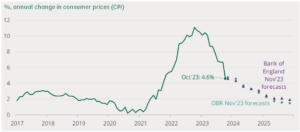
In 2023, the UK economy experienced falling inflation, rising interest rates, and stock market volatility. It’s been difficult to predict what could happen next, and economists have been frequently surprised by events that unfolded.
Even though it’s not possible to be sure what will happen in 2024, it can be helpful to discover some of the likely trends that could affect your finances.
Read on to discover how the UK economy could fare in 2024, and what it could mean for your investments.
1. Inflation is likely to continue to fall albeit more slowly than it did in 2023
The Bank of England (BoE) expects inflation to continue to fall during 2024, although it won’t fall quite as quickly as it did this year. This is because inflation is expressed as a percentage change in price rises from one year earlier.
The annual figures in 2024 won’t include the spike in energy prices that we experienced in 2022. This means the drop in price rises may be less pronounced than they were this year.
A fall in inflation means that prices are still rising, just at a slower pace than previously.
The Office for Budget Responsibility and BoE predict that inflation will fall to around 3% by the end of 2024. By the end of 2025, they expect that inflation will be much closer to the 2% target that the government sets the BoE.
Office for Budget Responsibility and Bank of England inflation predictions for 2024-2025

Source: House of Commons Library
2. Interest rates could stay higher for longer than previously thought
Interest rates rose steadily throughout 2023, as the BoE attempted to bring inflation back to its 2% target. The idea behind this is that higher interest rates make borrowing more expensive, causing the general public to spend less, reducing demand and consequently lowering inflation.
After increasing the base rate at 14 consecutive meetings since December 2021, the Monetary Policy Committee has held rates steady at 5.25% at its past three meetings. MoneyWeek reports that economists believe the rate rises will peak either at the current rate or after one further rise to 5.5%.
What’s less clear is when interest rates could start to fall. According to a report by Fidelity, the Organisation for Economic Co-operation and Development (OECD) has predicted that the current rate of 5.25% could remain in place until 2025. This is because of persistent inflationary pressure on the economy.
Financial markets see things differently, though, with Fidelity reporting that markets have priced in an anticipated rate cut in Q2 of 2024.
Interest rate changes are based on data that the BoE monitors, including inflation, wage growth, and economic performance. So, while it’s not possible to predict exactly what will happen to interest rates in 2024, it seems likely that they will remain elevated from the ultra-low rates you’ve been seeing over the past 10 years.
3. The Bank of England predicts that the UK could fall into recession in 2024
Despite avoiding one in 2023, the UK economy has a 50% chance of falling into a “moderate” recession in 2024 according to the BoE.
A recession is defined as two consecutive quarters of negative economic growth. The Office for National Statistics (ONS) reports that the UK experienced just 0.2% growth in Q2 of 2023, and 0% growth in Q3.
With interest rates remaining elevated, inflation falling more slowly, and Gross Domestic Product slowing down, there’s a chance that the economy could fall into recession in the coming 12 months.
4. You might notice uncertainty reflected in the stock markets
As you’ve probably noticed, uncertainty really is the only certainty as we look ahead to 2024. While things are looking more positive on the inflation front, the risk of recession continues to loom large.
Investors dislike uncertainty because it increases risk. This can cause them to ditch some of their stocks for the perceived “safety” of cash and bonds.
As a result, you could see fluctuations across many major indexes, which might affect the value of your investment portfolio.
While this can feel unsettling in the short term, it’s important to remember that most planners recommend taking a long-term view of your investments. As you can see from the graph below, the longer you hold investments for, the more opportunity your money could have to grow in value over and above the rate of inflation.
Historical stock market returns in excess of inflation from 1926 – 2022

Source: Schroders
So, rather than panicking if your investments underperform this year, try to keep in mind that occasional drops in value are to be expected. What’s more important is the opportunity for long-term financial gains across your portfolio.
Get in touch
If you’re concerned about how economic events could affect your wealth or your retirement plans in 2024 and beyond, we can help.
Please get in touch by emailing us at financial@barwells-wealth.co.uk or by phone on 01273 086 311.
Please note
The value of your investments (and any income from them) can go down as well as up and you may not get back the full amount you invested. Past performance is not a reliable indicator of future performance. Investments should be considered over the longer term and should fit in with your overall attitude to risk and financial circumstances.
This blog is for general information only and does not constitute advice. The information is aimed at retail clients only.







 Production
Production